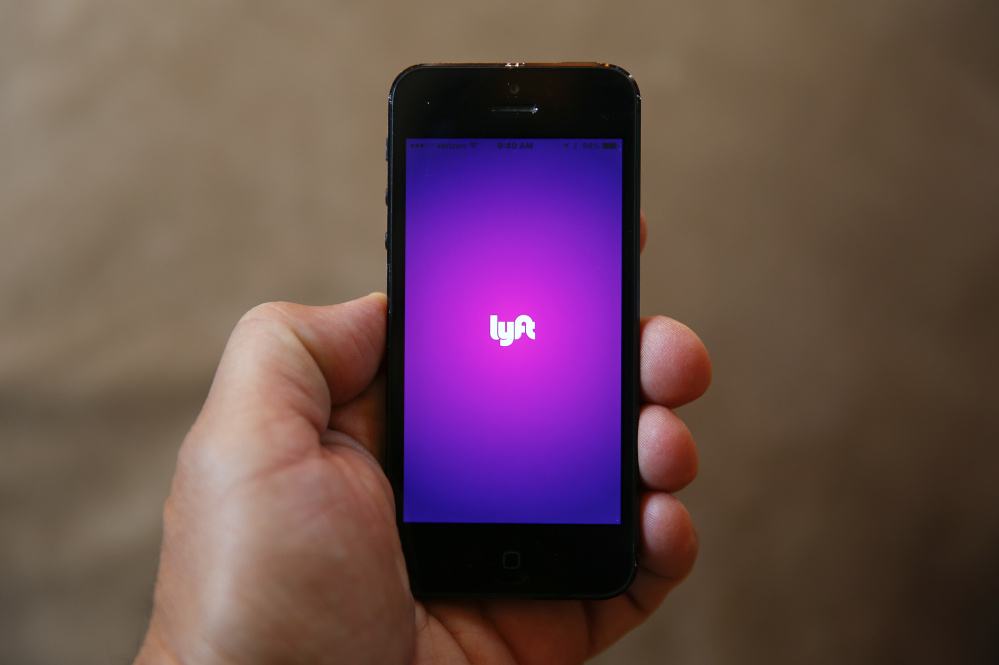Another ride-sharing service soon may be coming to Maine’s largest city.
San Fransisco-based Lyft, which competes with traditional taxi cabs and with rival ride-sharing service Uber, has applied for a permit to operate in Maine, according to state officials. The company also contacted Portland officials within the last month about launching a service, and it has been advertising for drivers.
“I had a single notice from them that they were tentatively planning to start in Portland on July 28,” said Paul Bradbury, director of the Portland International Jetport, which regulates cab companies in the city. “I figured they’d follow up, but I haven’t received anything since then.”
Representatives of Lyft said they plan to make an announcement in Portland this week, but would not provide additional details until Thursday.
Ride-sharing companies are becoming increasingly popular as a convenient way to get around cities across the country, and as a way for part-time drivers to earn extra income. But they also have run into conflicts with regulators and established taxi companies, and have fueled concerns ranging from regulatory fairness to passenger safety.
Known as Transportation Network Companies, they use computer software and smartphone apps to connect passengers with drivers, who make their own hours and pick up people in the drivers’ own vehicles.
Cab operators complain that these ride-sharing companies have an unfair advantage because they are not subjected to the same regulations, especially when it comes to insurance, licensing fees, background checks for drivers and fares. For example, taxi fares are strictly regulated by the city, whereas ride-sharing companies are allowed to increase their prices when demand peaks, a practice known as surge pricing.
MAINE LAW BANS LOCAL REGULATION
There have been efforts to regulate the companies and level the playing field, both here and nationally.
Last year, the Maine Legislature passed a law requiring ride-sharing companies to provide proof of insurance to the state, as well as pay a $10,000 fee annually to get a business permit to operate here. The law also prohibits municipalities from further regulating the industry.
Cab companies argue that the state regulations do not go far enough.
“I hope the state allows the city to regulate them or comes up with a better system,” said Craig Corbett, owner of 207 Taxi in Portland. “It’s unfortunate (ride-sharing companies) can do what they want.”
After cab companies that pay for special access to the jetport complained about Uber drivers swooping in to take rides, the company agreed to adjust its app to prevent its drivers from hovering near the passenger terminals. Uber drivers who are too close to the terminal are prohibited from picking up passengers at the airport. Bradbury said Lyft has verbally agreed to do something similar to prevent congestion, but city officials will not know for sure until the company launches its app.
Uber is currently the industry leader in ride-sharing, with Lyft as its biggest competitor. Both companies are based in San Fransisco. Uber was founded in 2009 and Lyft in 2012.
Uber, which began operating in Portland in 2014 and recently expanded to Lewiston, Auburn, Bangor and Orono, is currently permitted to do business in Maine, while Lyft has paid for its permit but is awaiting approval from the Maine Bureau of Insurance, said Kristen Schulze Muszynski, communications director for the Department of the Secretary of State.
When the two companies go head-to-head, they typically compete more directly for drivers than they do for passengers.
Lyft, which uses a pink, dashboard-mounted mustache to identify its drivers, has begun advertising for them in the Portland area. Bradbury said he recently heard a radio ad that made the point that Lyft drivers can receive tips through the app, whereas Uber drivers cannot.
Earlier this year, National Public Radio reported that competition for drivers in some places has been so fierce that Uber hired hundreds of people throughout the country to take rides with Lyft drivers for the sole purpose of recruiting them. NPR spoke with two dozen drivers who worked for both companies and said the primary difference between the two companies is that Lyft passengers expect a more friendly experience, while Uber passengers expect a chauffeur.
DIFFERENCES BETWEEN THE RIDES
There is even a website dedicated to comparing the two services. Lyftvsuber.com claims to be operated by someone who is not affiliated with either company. It says both companies offer comparable costs, safety, customer support, driver benefits/perks and apps.
However, the site says Uber earns higher marks for its professionalism for people who want a quiet ride in the backseat, whereas Lyft is more laid-back. Uber also is more popular and attracts more private investment in the company.
The site gives Lyft higher marks for surge pricing, indicating that prices may only increase between 25 percent and 200 percent during peak hours, whereas Uber’s prices may increase as much as 700 percent to 800 percent. It is also more difficult for passengers to notice when surge pricing is in effect when using Uber, the website says.
“If you want a front-seat, engaging and fun ride, Lyft is generally your choice. Uber drivers are more likely to open your door and dress well, whereas Lyft drivers are instructed to greet you as a friend with a fist-bump,” it says.
Although he’d like to see more equitable regulations, Corbett, from the cab company, said he’s not worrying too much about the addition of another ride-sharing service, because it’s beyond his control.
“All I can control is trying to provide the best service and the cleanest cars in town,” he said. “If you provide a better service and do a better job, people will use your service.”
Randy Billings can be contacted at 791-6346 or at:
Twitter: @randybillings
Send questions/comments to the editors.




